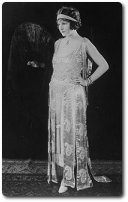Wide Sargasso Sea Contents
- Social / political context
- Religious / philosophical context
- Literary context of Wide Sargasso Sea
- Overview
- Part one: Antoinette's first narrative
- Part two: Rochester's narrative
- Part two: Antoinette's narrative
- Part two: Rochester's narrative resumes
- Part three: Grace Poole's narrative
- Part three: Antoinette's narrative
Women and power
Rhys' women characters
 Jean Rhys' early stories from the 1920s and 30s focus on women who are alone and powerless. Characteristically, they have come to the end of a love affair and find themselves without its emotional support. These are women who have relied upon their sexual power to attract men, a power which has also brought them a degree of economic support from their lovers. Jean Rhys shows us what can happen to a woman once her sexual power wanes, when she has no money and very limited options for earning any.
Jean Rhys' early stories from the 1920s and 30s focus on women who are alone and powerless. Characteristically, they have come to the end of a love affair and find themselves without its emotional support. These are women who have relied upon their sexual power to attract men, a power which has also brought them a degree of economic support from their lovers. Jean Rhys shows us what can happen to a woman once her sexual power wanes, when she has no money and very limited options for earning any.
In Wide Sargasso Sea Jean Rhys engages with other forms of powerlessness:
- In ‘writing back' against Jane Eyre she shifts her historical perspective to look into the condition of women in mid nineteenth century Britain. For further information on Jane Eyre see Texts in detail > Jane Eyre
- In rewriting the story of Bertha Mason, a White Creole heiress from the Caribbean, she engages with the powerlessness of women in relation to colonial power and slavery
- She is also able to take up and question a long-standing cultural association between women and madness.
Women's rights in mid nineteenth century Britain
In considering the historical context for Rochester's treatment of his wife, it helps to have some basic information on the legal position of women in England at this time:
- English law did not recognise women as independent entities at all until 1839
- Until the Matrimonial Causes Act of 1857, divorce was not available without a special act of Parliament and that was prohibitively expensive for all but the very rich
- Rochester is not doing anything against the law in imprisoning his wife, whether she was mad or not. Married women who ran away from the family home could be forcibly returned to it.
Implicit in Jane Eyre is the general and accepted understanding that, on their marriage, Bertha's money became Rochester's to do with as he pleased. This was  the case until the First Married Women's Property Act of 1870. In such a patriarchal society, it was the duty of an heiress's family of to ensure that money was settled on her independently by a special legal arrangement. Without that money of her own, a married woman was economically powerless. John Stuart Mill, in The Subjection of Women (1869), made the connection between women and slaves. He stated that a wife's legal position in England was worse than that of a slave in other countries.
the case until the First Married Women's Property Act of 1870. In such a patriarchal society, it was the duty of an heiress's family of to ensure that money was settled on her independently by a special legal arrangement. Without that money of her own, a married woman was economically powerless. John Stuart Mill, in The Subjection of Women (1869), made the connection between women and slaves. He stated that a wife's legal position in England was worse than that of a slave in other countries.
Antoinette's economic position
In Wide Sargasso Sea Jean Rhys examines this situation in relation to Antoinette, who is not protected by her family. Rochester is well meaning to begin with and intends to make her a legal settlement of her own money. But he becomes increasingly vindictive and cruel, so fails to do this, ensuring that Antoinette is completely in his power.
Women in the Caribbean society of the novel are aware of this:
- Aunt Cora secretly gives Antoinette two valuable rings so that she would have something to sell
- Christophine is very alarmed once she realises that Antoinette has no money of her own.
The novel makes a careful contrast in this respect between the newly married Antoinette and Christophine, who, despite being a former slave, is free and independent, with a house and garden of her own. She, unlike Antoinette, can take her belongings and turn her back on any relationship with a man.
